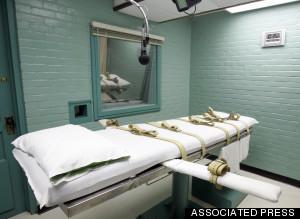
The recent botched execution in Oklahoma reminds me of what looks like an exercise in double- or triple-think on the part of the death penalty's supporters. If, as we are told, capital punishment functions as a deterrent, why are the executions done in private? Wouldn't the deterrent effect be more pronounced if everyone was able to see the terrible retribution? Attendance should be mandatory for young boys, in particular. Instead, you need to be related to the condemned, or to the crime victim, or work for the Department of Corrections or in media, to get to see it.
Lethal injection, on account of its clinical and bloodless efficiency, is currently the favored means of executing people in the U.S.--and, if you exclude countries we consider backwards and barbaric, it is pretty much only our country that still does it. But it seems that the clean kill that is apparently the modern executioner's goal must also work against the deterrent effect. Shouldn't the object be to make it as gruesome, and as public, as possible?
No wonder that social science can detect no deterrent effect. We are going about it all wrong.
Opponents of capital punishment fret about errors resulting in grotesque and irreversible miscarriages of justice. No, no, we are assured, that doesn't happen. But it seems strange that the people doing the assuring are the same ones who, on other days, regularly insist that government can't do anything right and shouldn't be permitted even to deliver the mail. Courts and juries, for indeterminate reasons, must be different. Even if we put aside human fallibility, though, the standard for determining guilt permits jurors to harbor some doubt.
If government is to be limited, one thing it could refrain from is deciding who isn't fit to live, and killing those who aren't.
What happened last week in Oklahoma doesn't inspire confidence in this supposedly inerrant system. The authorities tried to kill a man. When they failed, they began trying to help him, so that they could have another run at it later. But they failed at that, too. As one journalistic observer put it, the executioners accidentally killed a man while trying to put him to death.
